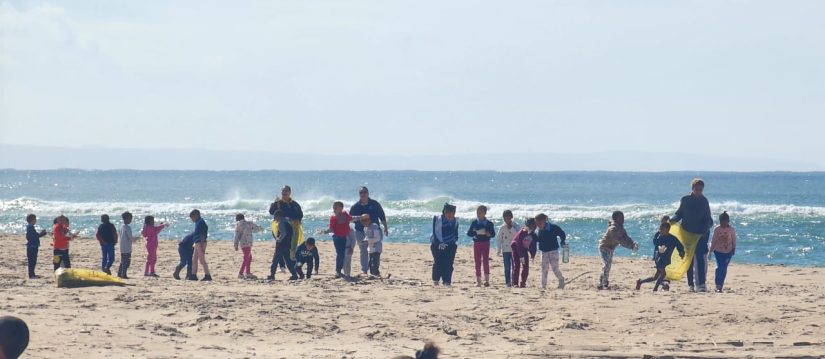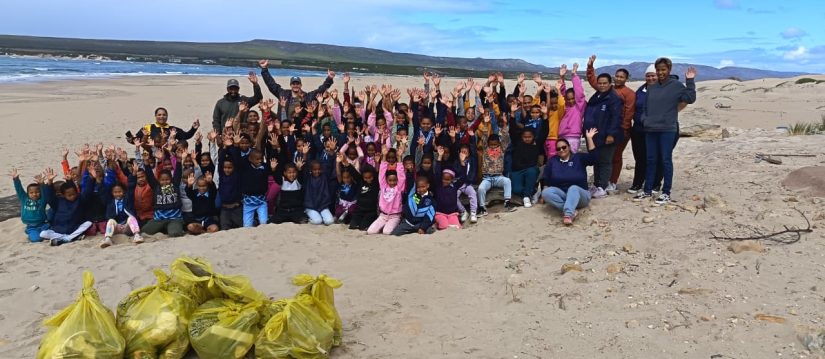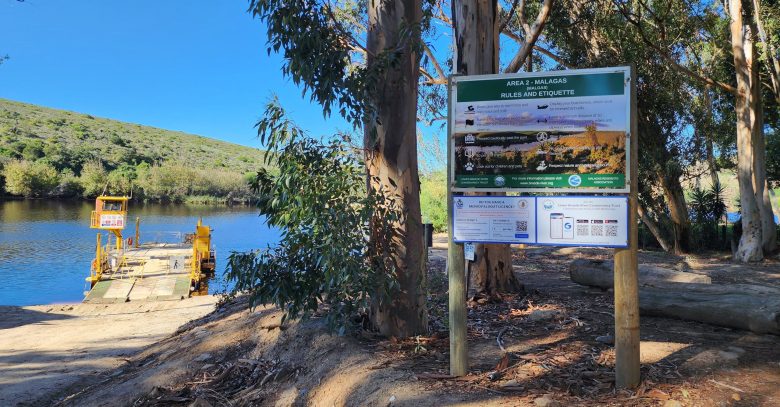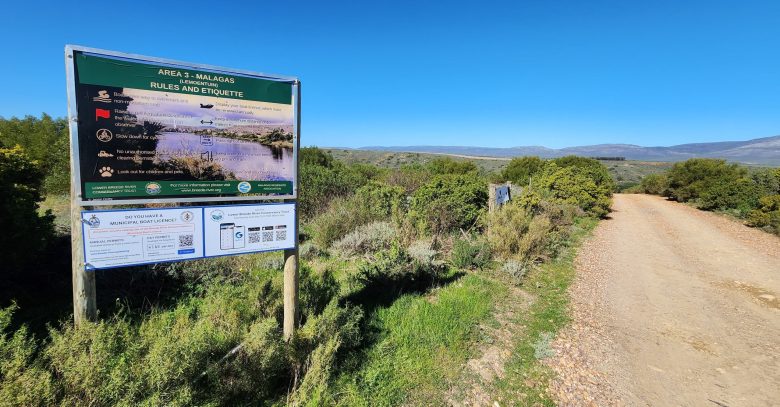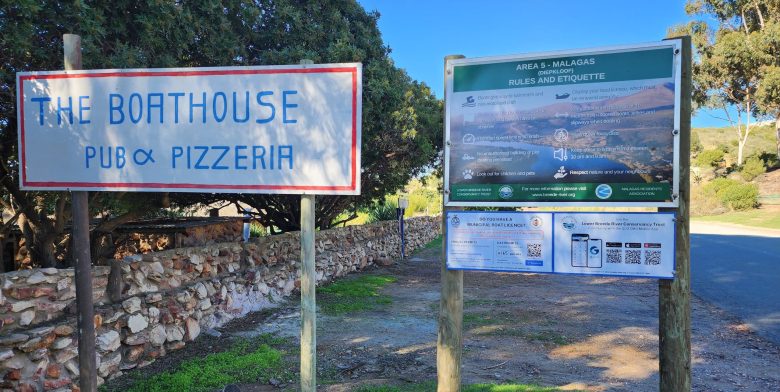Recycle Month at the Breede River
September is recognised as Recycle Month in South Africa. The month is dedicated to encouraging citizens, businesses, and schools to adopt sustainable waste management practices, particularly focusing on the importance of recycling to reduce landfill waste and protect natural resources. Lead by various environmental organisations and supported by government campaigns, Recycle Month promotes activities such as clean-up drives, recycling workshops, and community engagement programs. It aims to raise awareness about the environmental and economic benefits of recycling, emphasising the role each individual can play in building a cleaner, greener South Africa.
On the 17th of September, our ranger Chad scanned the riverbank from the Kraaltjie launch site in Witsand to Groenpunt for River Clean-up Day in South Africa. He picked up 10 kilograms of litter. The main items included discarded bait packets, fishing line, glass bottles, tin cans and various pieces of plastic.
The LBRCT is one of hundreds of organisations that participate in the International Coastal Clean-up - a global initiative run by the Sustainable Seas Trust. Every year our Conservancy signs up as one of the many coordinators along the South African coastline to join this collective effort. In doing so we receive refuse bags and gloves for all volunteers. This year the clean-up fell outside of the school holidays and this resulted in fewer volunteers. However, just over a week later we returned with the entire Vondeling Primary School to conduct another clean-up.
The International Coastal Clean-up 2025 was held on the 20th of September and attended by 12 adults and 7 children, who collected a total of 7 bags of litter, weighing in at over 16 kilograms. Thank you so much to the local businesses who sponsored gift vouchers and other prizes. Congratulations to the winners of the lucky draw!
At the end of September, over 90 students from Vondeling Primary School collected another 8 bags of litter, weighing a total of 34 kilograms. Most of the items were small pieces of plastic, foam, rope, nurdles, and fishing line. The children were all given a small stationery set, a health bar, peanuts, raisins, and a bottle of water to enjoy upon their return to school.
Donations of any kind towards future school events will be highly appreciated.
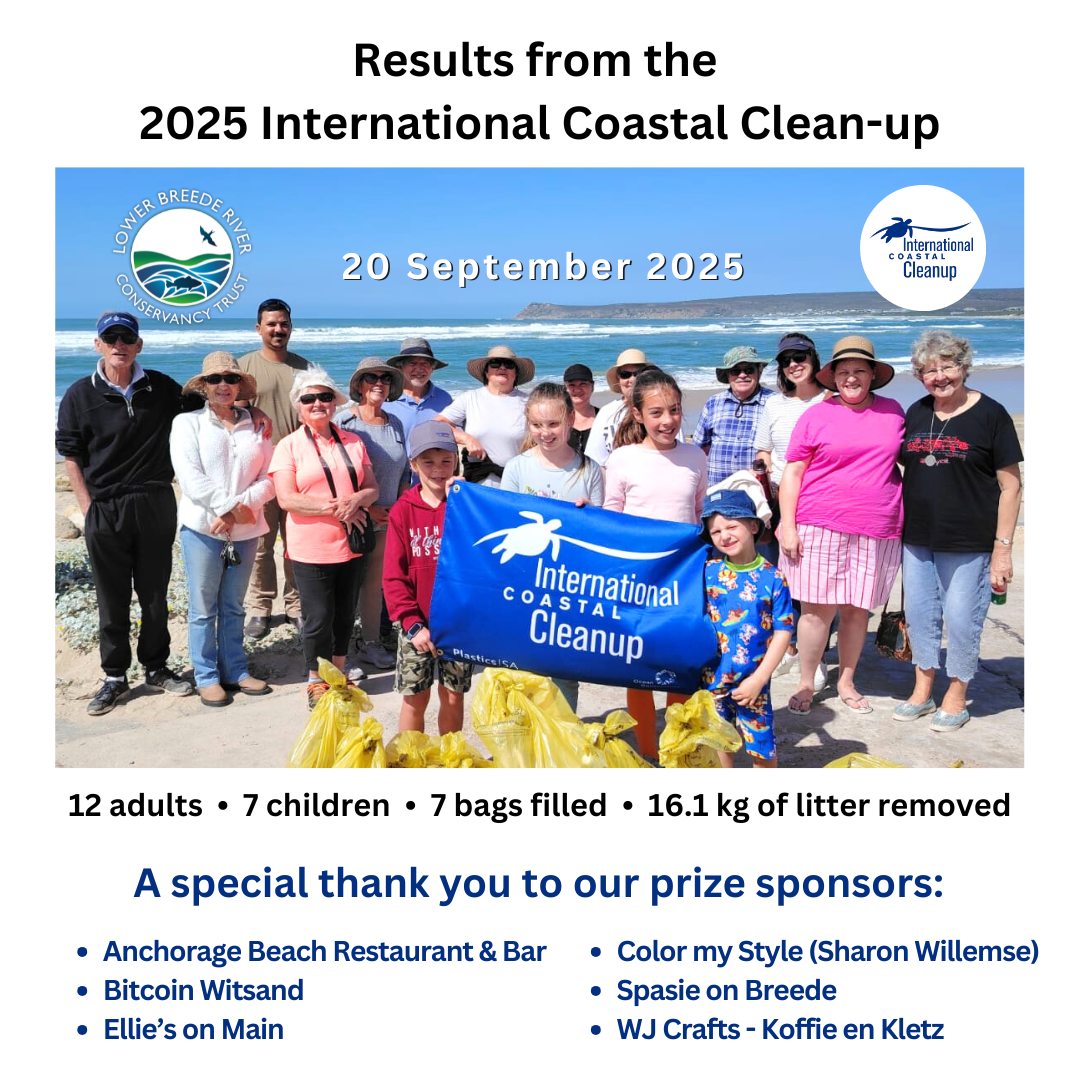
On the road with the LBRCT Rangers
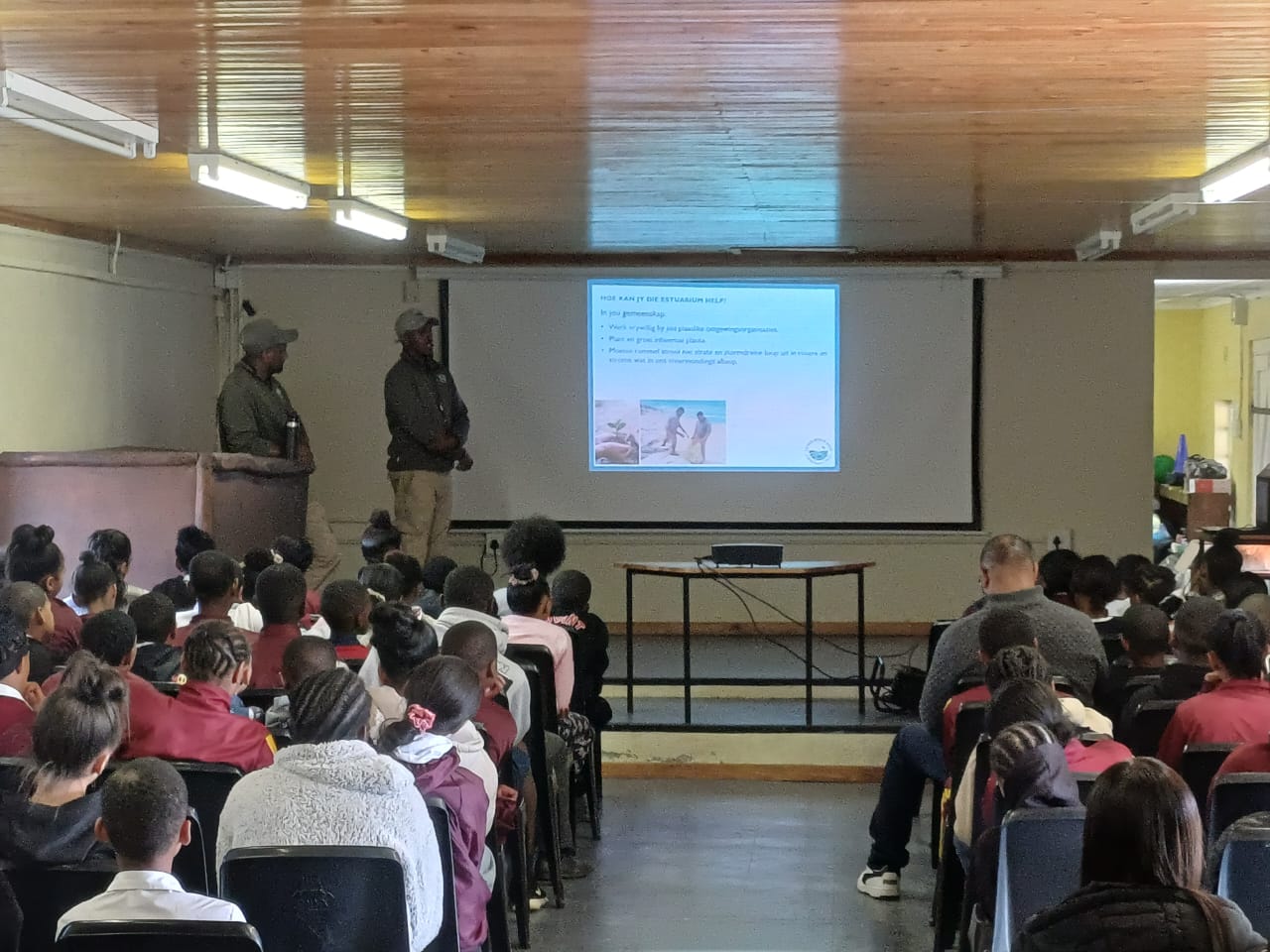
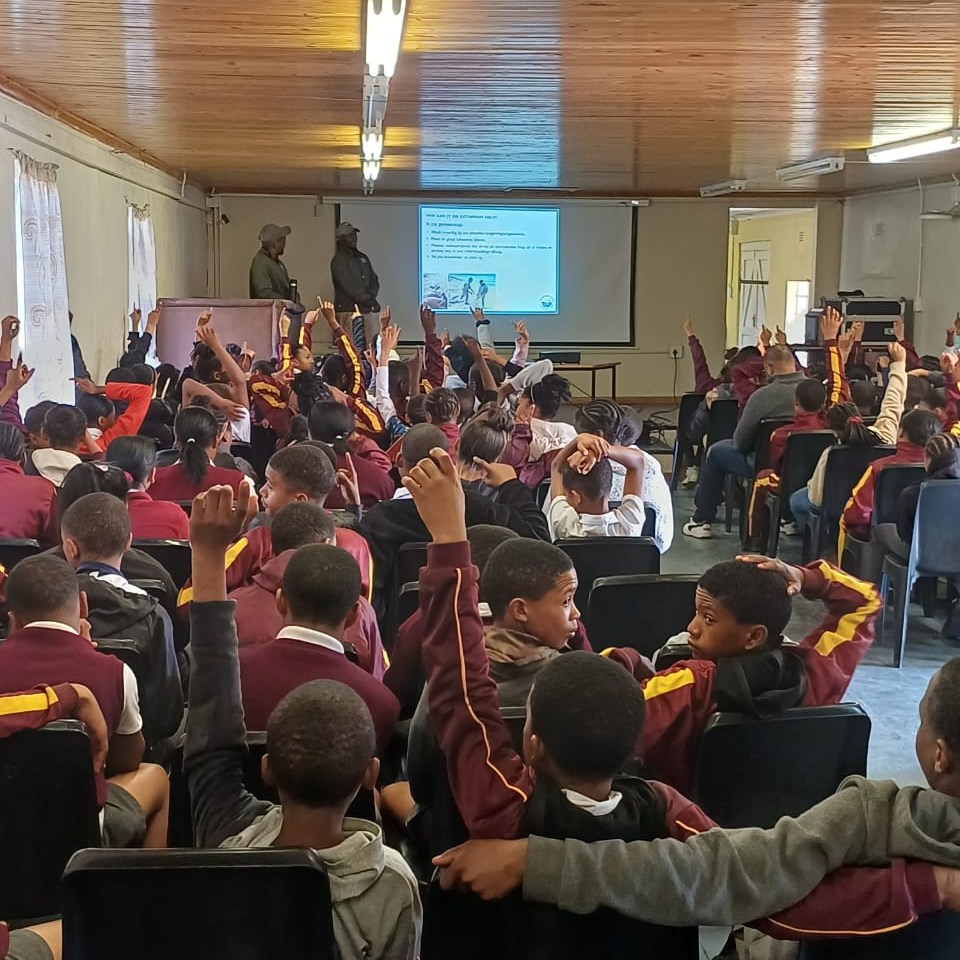
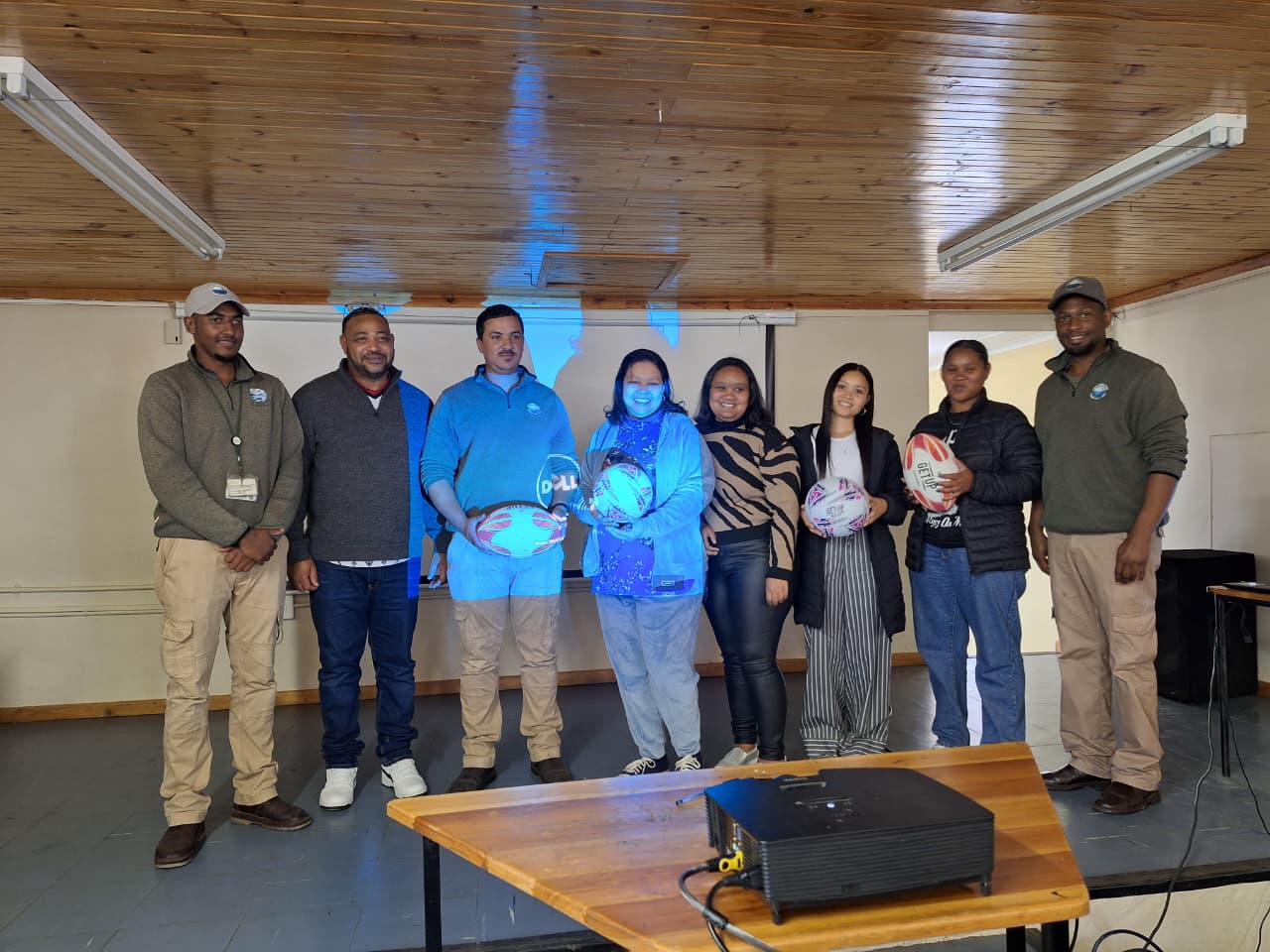
In early September we had the pleasure of visiting Mullersrus Primary School in Buffeljagsrivier. Our rangers educated the students on what an estuary is, the work that we do, and why the Breede is one of the most important estuaries in South Africa. Rugby and netball balls were also donated to the school.
Should you wish to donate towards future school visits, it would be most appreciated. The LBRCT is a registered NGO and PBO that can issue tax certificates for donations. Please contact us by emailing info@breede-river.org or WhatsApp 064 774 3862 for more information.
BE AWARE: It's Snake Season!
Here's what you need to know.
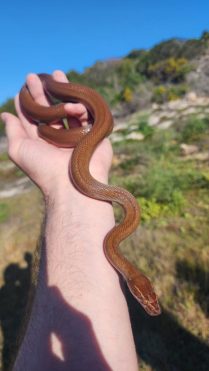
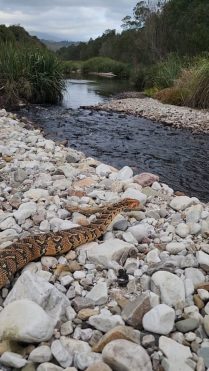
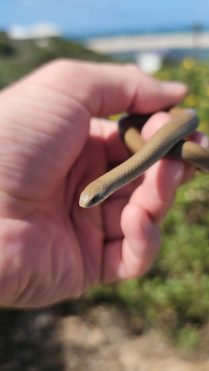
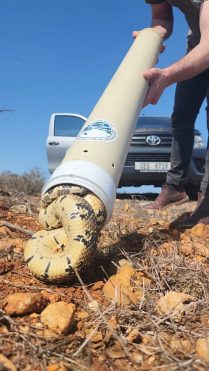
People often think that our snakes go into hibernation during winter,
but that is not the case. As the temperature drops, snakes become less active and spend far more time underground. Some snakes, like Puff Adders and the Southern African Python, mate in the middle of the winter in the northern parts of their range, where day temperatures often exceed 23 degrees Celcius. Snake sightings are rare during winter when most of our snakes are in a state of torpor and do not feed. Most snakes mate in spring with females emitting pheromones to attract males. Over much of southern Africa, snakes become very active after the first spring rains, and this is when we see an increase in snake encounters.
What should one do should you encounter a snake?
Immediately retreat at least five paces and observe the snake from that safe distance. Never attempt to catch or kill a snake unless you have been trained in safe snake removal and have the right equipment. Avoid using braai tongs or garden gloves to remove a snake. Immediately clear the area of people and remove all pets, especially dogs. Dogs are natural hunters and are quick to try and kill any snake they encounter. Call your local snake remover - click here to download the African Snakebite Institute App to search for snake removers in your area. Or if you live in Witsand, call Jason Oxley on 064 774 3862.
How to keep snakes out of your property:
Unfortunately, there is no effective snake repellent. This includes substances such as Jeyes Fluid, old oil, diesel, moth balls, various plants and commercially available snake repellents. Keep your garden clean and neat and remove building rubble or other materials which make for suitable hiding places. Water features, pet food in outside bowls and aviaries will attract snakes as they hunt for rodents and toads. Physical barriers like shade cloth or zinc sheeting wrapped or placed around a fence without gaps and around 1m high will often prevent snakes from entering a property.
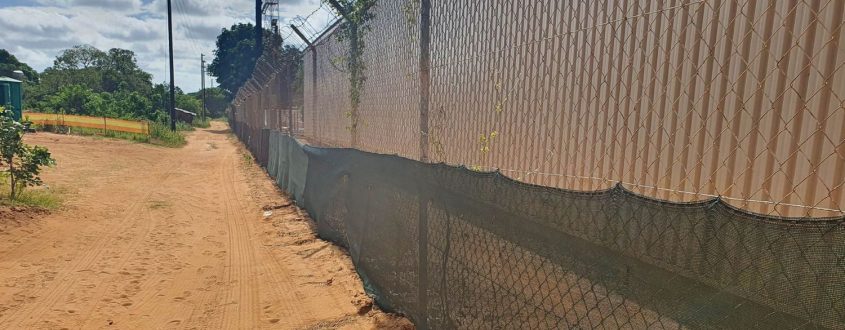
In the event of a snakebite:
Keep the patient calm and ensure that the snake is no longer in the immediate area. A second bite will complicate matters. Avoid tight bandages, especially arterial tourniquets. Cutting and sucking has no benefit, as snake venom cannot be sucked out. Avoid all other home remedies and transport the patient to the nearest hospital emergency room. You can remove jewelry like rings or watches as well as restrictive clothing around the bite site as the majority of bites will result in swelling. Keeping the limb elevated above the heart will reduce pain and throbbing. Always bear in mind that a lack of oxygen results in most snakebite fatalities, with the main culprit being the Cape Cobra in our area. If the patient is in hospital and breathing is compromised, the medical team can stabilise the patient, intubate and ventilate the patient. Antivenom is not a first aid measure and can only be administered by a medical doctor. Nine out of ten snakebite victims that are hospitalised do not receive antivenom as it is not always necessary. Many bites are not severe and can be treated symptomatically. Refrain from trying to kill the snake to take it along to the hospital – doctors do not need to know what snake was responsible for a bite, but a clear photograph of the offending snake may well assist medical staff as they will have an indication of what symptoms to look out for. Bites are generally treated based on symptoms that present in the patient. Most snakes try and make a quick escape when disturbed. However, snakes that are stood on or attacked will defend themselves. As we approach warmer weather, make sure you are vigilant for the snake season.
Get to know your snakes of the Breede River Estuary. Download this pamphlet and save it to your device - https://bit.ly/3TmsMx9
Call Jason on 0647743862 or the LBRCT for snake removals in Witsand.
Jason holds a permit authorising him to catch snakes in the area. After capturing the snakes, he ensures that they are safely released far away from the village.
CAUTION:
Rabies and Bird Flu in the Western Cape!
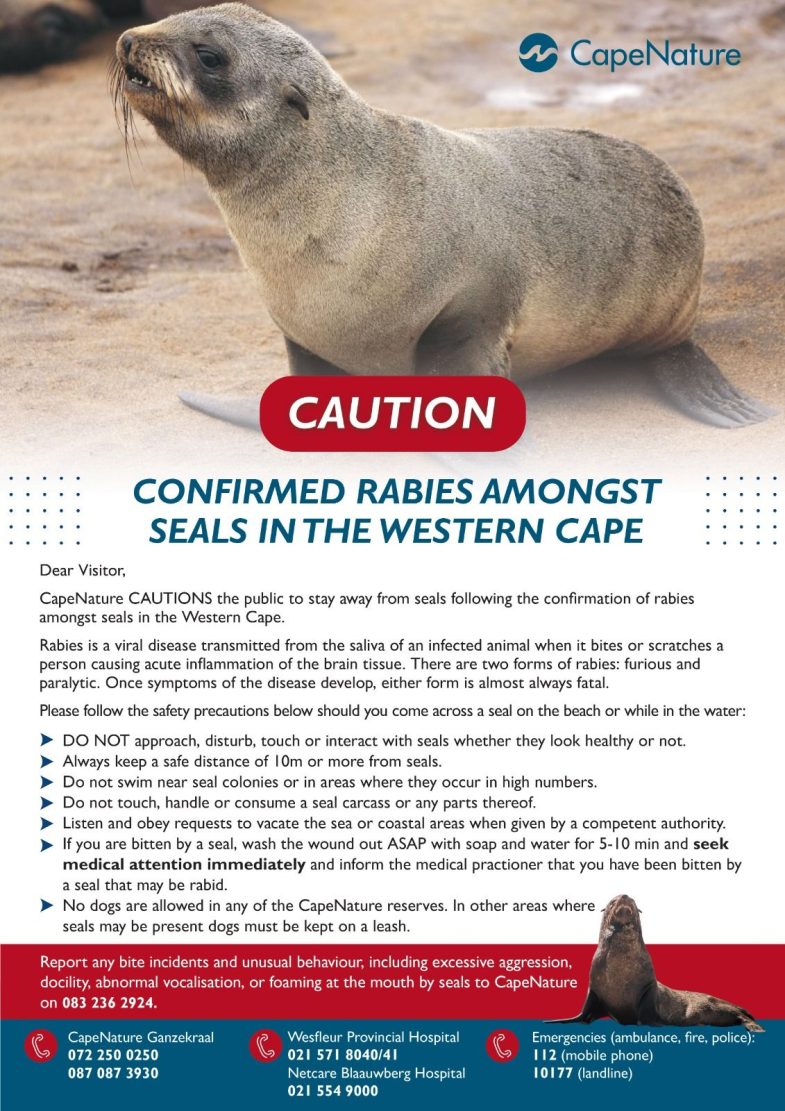
Avian Influenza detected in Western Cape: Public urged to stay alert, not alarmed.
Since early July 2025, a new outbreak of high pathogenicity avian influenza (HPAI) has been confirmed in wild seabirds across the Western Cape. These are the first wild‐bird detections in the province since April 2024. Wild seabirds infected with HPAI often develop neurological signs such as tremors, head twitches and seizures. Although HPAI occasionally infects mammals and humans, the risk to the public remains very low when basic precautions are followed. Members of the public are encouraged not to touch sick or dead birds and to report them to the LBRCT.
What is High Pathogenicity Avian Influenza?
High pathogenicity avian influenza (HPAI), also known as bird flu, is a viral disease that causes rapid, severe illness in birds. The type of HPAI affecting seabirds in South Africa is officially known as H5N1 clade 2.3.4.4b.
Which birds have been affected?
At the beginning of August 2025, most of the affected wild birds were Hartlaub’s gulls. Cases have also been reported in Great white pelicans, Grey-headed gulls, Kelp gulls, Whitebreasted cormorants, Crowned cormorants and Sacred ibises. Domestic chickens and ducks have also been affected.
Look out for our LBRCT Communications App!

Signs displaying scannable QR codes for Day Permits and the new Mobile Communications App have been installed underneath the existing Malgas area signs.
With the LBRCT added as a community on the GLO CMS app, you can explore the content for useful information relating to fishing, boating and important regulations. Be sure to click on the more button for additional links.
The app has many features which will be used to keep you informed and up to date with special events, stakeholder engagements, annual meetings, and important notices.
Apple App Store - https://apple.co/4cgCLeF
Google Play Store - https://bit.ly/3Egtgj7
Huawei App Gallery - https://bit.ly/429FORq
Fishing line is a death trap for coastal wildlife!
Discarded or improperly used fishing line poses several dangers to marine life and the environment. Entanglement can cause injury, infection, and death in animals such as birds, seals, dolphins, and fish. Fishing line is also a source of pollution, accumulating in the ocean for decades due to its non-biodegradable nature. Please dispose of your fishing line responsibly.
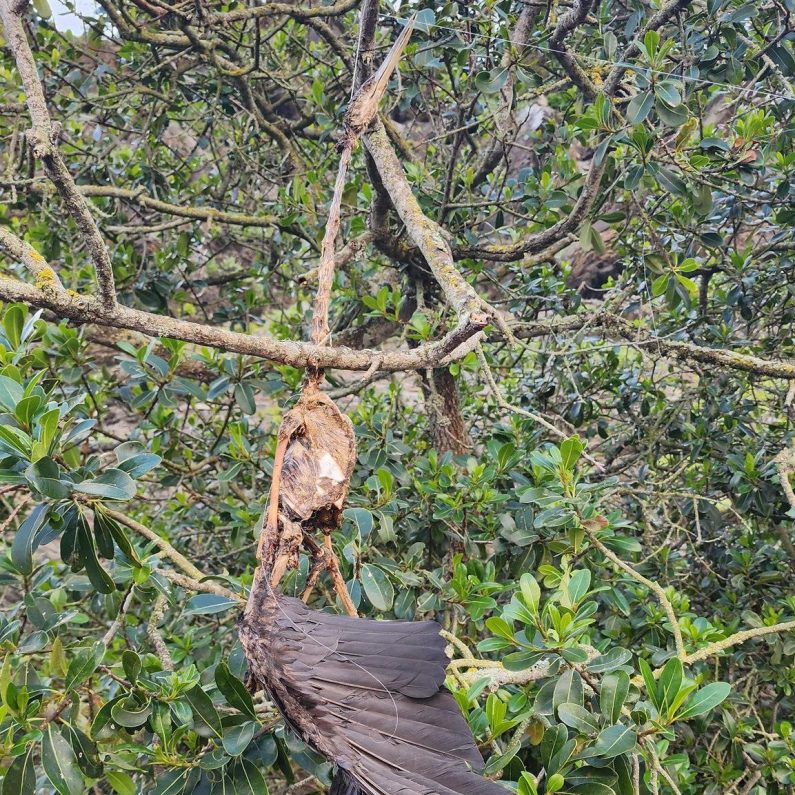
Buy your Recreational Fishing Permit online:
We are pleased to announce that Recreational Fishing Permits are available online! Please visit https://www.fishing.dffe.gov.za/ to purchase your permit.
Please remember that should you intend on fishing from a vessel, at least one crew member requires the permit condition for an "additional fee per vessel for recreational fishing from such vessel" to be selected.
Breede River Locations Map
Click here to view a map of the Breede River Estuary containing the locations of popular spots, attractions, restaurants & pubs, accommodation, boat licence sales outlets, public slipways, and more!
Should you have any environmental concerns relating to the Breede River Estuary, please click here to complete a short questionnaire.
REMINDER:
Current and Upcoming Closed Seasons
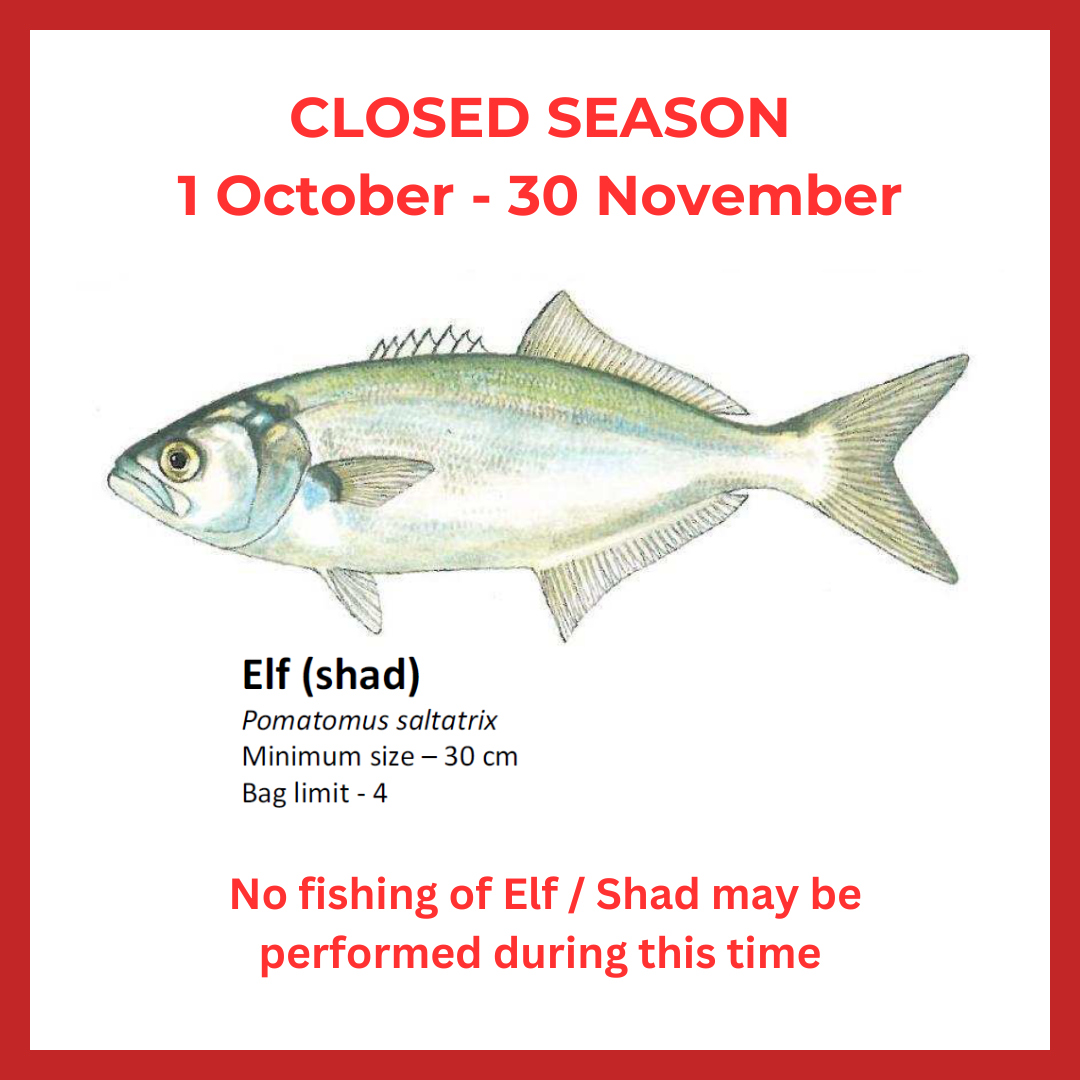
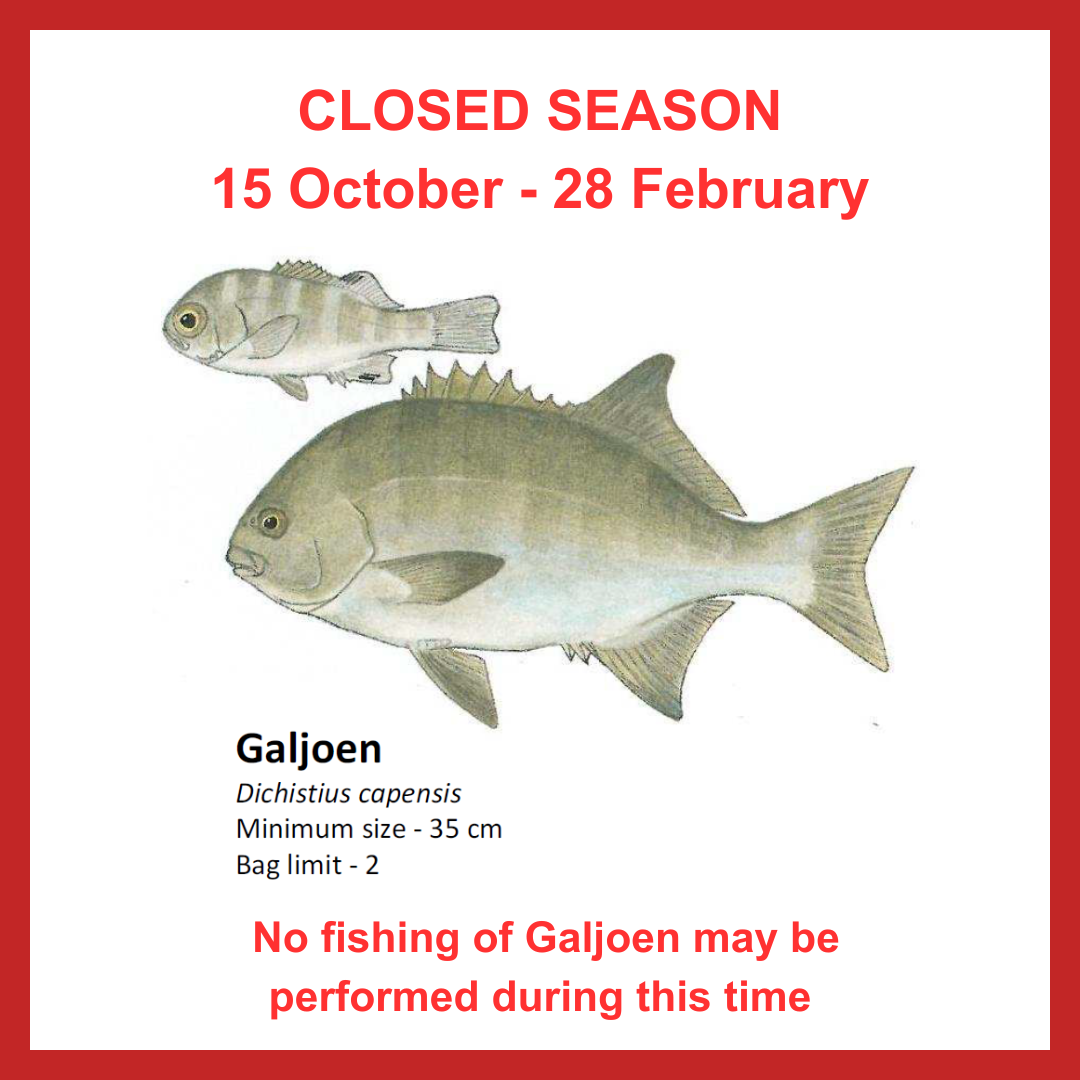
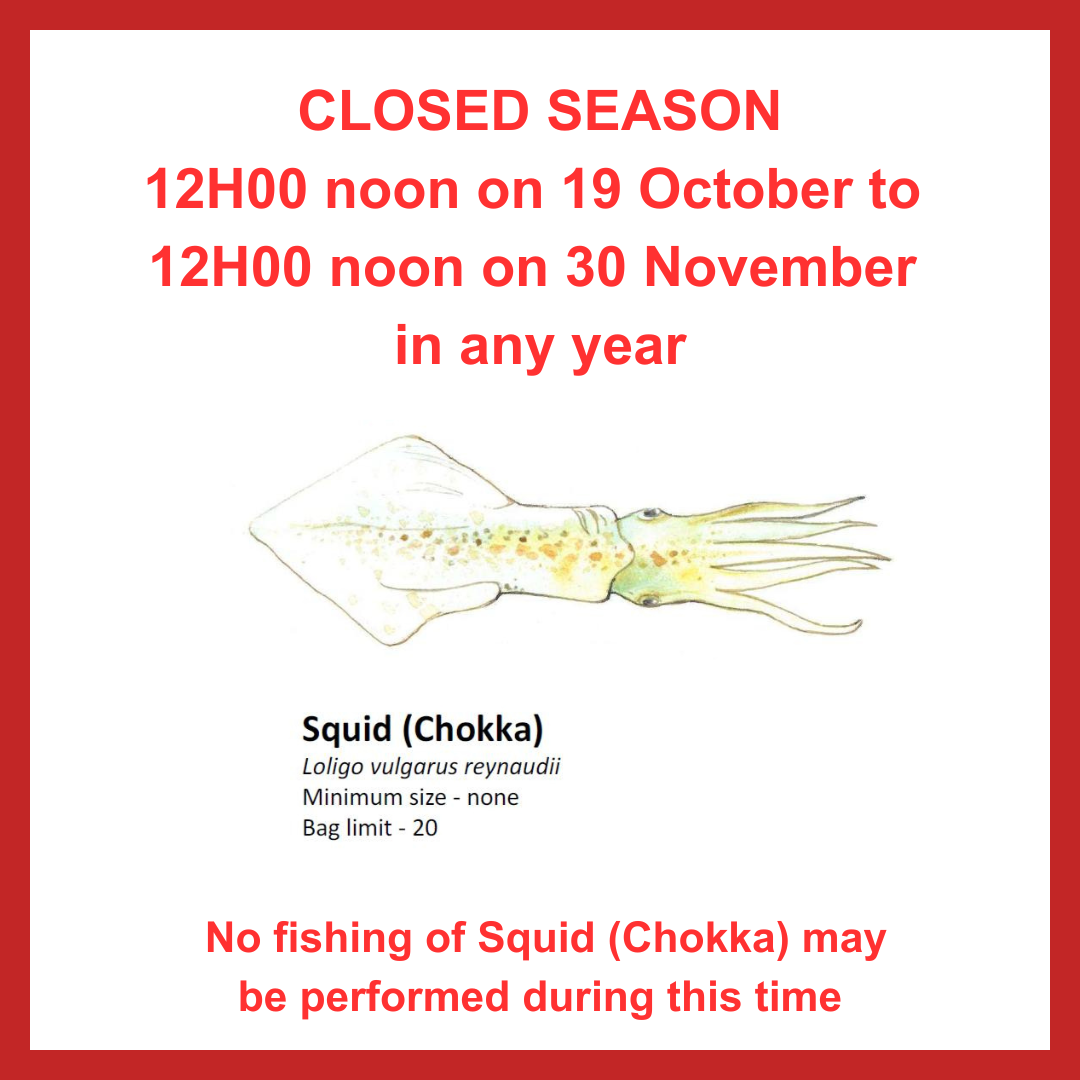
Grab your Fish Measuring Sticker for Free!
Visit our office in Witsand to collect a free fish measuring sticker for checking minimum size and bag limits of common fish and bait species.

Legal Size Red Flags for Water Sports
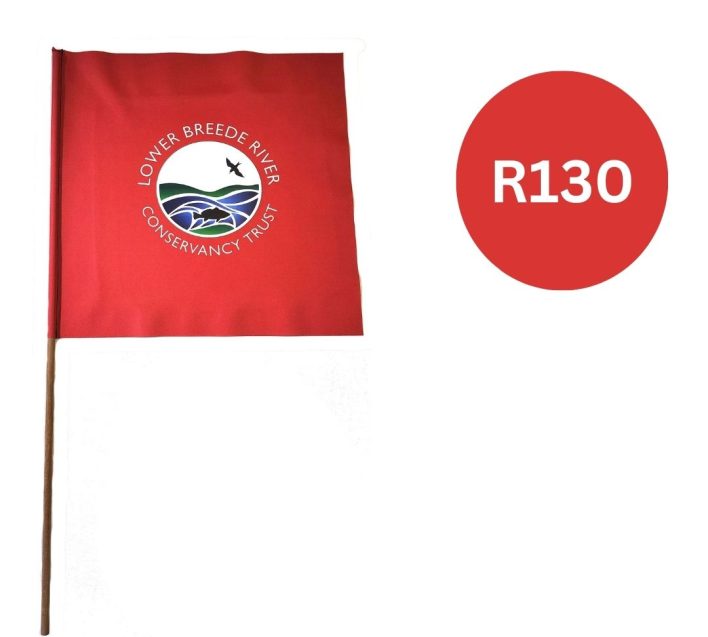
As per the municipal by-law, the operator of a boat towing a skier must display a red flag measuring a minimum of 500mm by 500mm to indicate when:
(a) a skier is down in the water, or preparing to ski;
(b) a tow line extends from the boat;
(c) a ski is in the water in the vicinity of the boat.
To purchase a legal size LBRCT red flag for only R130 please contact info@breede-river.org or WhatsApp 064 774 3862 to place an order.
Buy a Conservancy Cap

Are you a member of the LBRCT?
If you take an active interest in, or use the Breede River Estuary, we encourage you to become a member of the LBRCT and support our worthwhile endeavours on your behalf by way of contributing to these efforts. Memberships are due for renewal from the 1st of July 2025.
If you are interested in receiving news updates and other interesting information join our 'LBRCT Communications' WhatsApp group.
Click here to join the group.
Like what we're doing?
Leave us a review:


